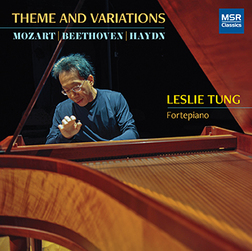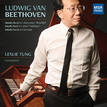LESLIE TUNGAlso Available
 THEME AND VARIATIONSMusic by Mozart, Beethoven and HaydnLudwig van Beethoven, Franz Joseph Haydn, Wolfgang Amadeus Mozart LESLIE TUNG, Fortepiano Solo Album Debut [MS1683] $12.95 LISTEN
REVIEWS
"I now find performances on period instruments invariably interesting and, at times, revelatory. This recording, which is my first encounter with the fortepianist Leslie Tung, is no exception... Tung impresses with his sense of humor, attention to detail, and ability to gently and seamlessly move the music forward... Abetted by his transparent instrument, Tung provides a reading that is consistently fresh and engaging, while remaining appropriately elegiac... this is a recording that deserves your attention. The balanced, expert sound engineering does not hurt either."Radu A. Lelutiu, Fanfare [July/August 2019]"Tung plays reflectively, like he was made for the music, which clearly he is. The approach centers around density, velocity, variety and of course contrast. It is actually fun to listen to this music, as it should be... Leslie Tung gives us the period-dynamo sound we need for these. Beautiful."Grego Applegate, Gapplegate Review [July 2019]"The tiny nuances of classical musical expression, which often challenge even the best qualified musicians, did not present any challenge to Leslie Tung... While listening to the CD many times, I was impressed by the particular subtlety of both Mr Tung's instrument itself and his interpretative style upon it. Above all, I was absolutely certain that this album was a rare and unusual musical find."Anett Fodor, Music & Vision [September 2018]"[In the Beethoven] Tung elicits all the nuances of the fortepiano, using its unique sound – which partakes as much of the harpsichord as it does of the modern piano – to good effect... As in the Beethoven, Tung handles the Haydn and Mozart works with aplomb and shows just how well they work as fortepiano rather than modern-piano pieces, with the basic instrumental sound and the cleanness of ornamentation being especially noteworthy."[ * * * * ] Mark J. Estren, InfoDad [October 2018]"All [three works] are performed on the fortepiano–a precursor of the modern pianoforte that was used commonly during the lifetime of these three composers–by the magnificant keyboardist Leslie Tung. The fortepiano’s relatively constricted tonal and dynamic range helps to keep the focus on the musical ideas themselves and Tung shows them off with an admirable sense of idiom and sensitivity. Highly recommended."Rick Anderson, CD HotList [October 2018]PROGRAM NOTES
Composer Jan Swafford has written that variation form was “...an ideal learning exercise for a student, because it amounts to studying a fundamental element of what composition is about: taking a piece of material, an idea, and transforming it into new passages that share an underlying essence but sound different. So a student learns that an essential part of composing is a matter of contrast and diversity founded on unity and invention: fashioning many things from one thing.” In the hands of master composers, variation form was transformed from a student exercise to a projection of individual musical personality through compositional and instrumental virtuosity, and a display of how the lessons of unity and diversity could also be molded into an overarching dramatic architecture.Keyboardist Leslie Tung has been recitalist at the First International Festival and Conference on Fortepiano in Antwerp, the Michigan MozartFest, the Connecticut Early Music Festival, Festival Indianapolis and the Gilmore International Keyboard Festival. He has also been soloist with the San Luis Obispo Mozart Festival orchestra and Palo Alto Chamber Orchestra, and a duo pianist with his wife, Silvia Roederer, at the Carinthian Summer Festival in Austria and at the Conservatories of Music at Beijing and Shanghai in China. In addition, Tung has been guest artist at more than 40 colleges and universities, most recently at the Conservatoire National de Région Chabrier, the Academy for Performing Arts in Hong Kong and the Royal Conservatory of the Hague. Tung began his study of piano in his native St. Louis, Missouri, but pursued interests in the natural and social sciences at Yale, earning his degree in sociology. His professional commitment to music was a result of intense study under pianist and scholar John Kirkpatrick. Graduate piano studies followed under Barry Snyder at the Eastman School of Music and with Brooks Smith and John Perry at the University of Southern California. Tung is Professor Emeritus of Music at Kalamazoo College in Michigan, where he taught a wide range of topics, including a course in the Structure of Scientific Revolutions. His five-octave fortepiano was completed in 1983 by Janine and Paul Poletti, and is based on a circa 1795 instrument by Munich builder Johan Lodewijk Dulcken, which is currently in the collection of the Smithsonian Institution. PROGRAM
WOLFGANG AMADEUS MOZART (1756-1791)VARIATIONS ON “UNSER DUMMER PÖBEL MEINT” IN G MAJOR, K.455 FRANZ JOSEPH HAYDN (1732-1809) ANDANTE WITH VARIATIONS IN F MINOR, HOB. XVII:6 LUDWIG VAN BEETHOVEN (1770-1827) “EROICA” VARIATIONS AND FUGUE IN E-FLAT MAJOR, OP.35 Opening and Theme Variations Nos.1-15 Finale alla Fuga  MSR Classics |

